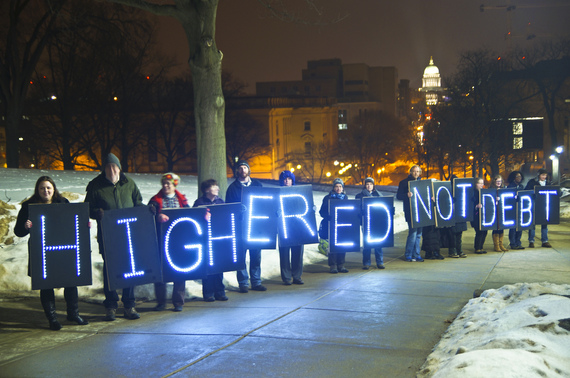The for-profit behemoth Corinthian Colleges is experiencing a spectacular fall. A $30 million fine by the Department of Education for falsifying placement data, numerous on-going state probes, a massive sell-off of schools and an abrupt bankruptcy filing that left some 16,000 students in the lurch. The string of accusations has become so large that a number of student borrowers cried enough, stopped paying their federal student loans and demanded the Department forgive those debts under an infrequently-applied clause tucked in the federal government's higher education legislation.
Both sides' actions have sparked strong opinions and the two questions on everyone's minds right now are whether borrowers should have those loans forgiven and what kind of role the Department of Education should be playing in all of this.
Unfortunately, what seem like clear-cut questions have turned into anything but.
First, we're talking two different groups of borrowers. One is the group of students who were still enrolled when Corinthian filed for bankruptcy. These individuals have a clearly defined path toward getting their loans discharged since Ted Mitchell, the undersecretary of education, has pledged to let them have their loans wiped or keep their credits and find another school where they can finish their degree. By some estimates more than 40 percent of these students were within 6 months of graduating.
For the other group, the Debt Collective, which has now bloomed to nearly a thousand former borrowers, their cause is being celebrated under some eyebrow-raising questions. Why should federal student loan borrowers be entitled to relief over those who paid out of pocket? Should recent graduates be eligible, even if they're employed? What about students who dropped out? How far back should borrowers be able to claim relief? If Corinthian students are entitled to forgiveness, shouldn't students at any, or every, college?
The ambiguity of who technically should be eligible for relief is compounded by the difficulty of staking a claim. Under normal circumstances the Department's standards for discharging federal student loans are remarkably rigid. In this case, even though the Higher Education Act provides borrowers a path to discharge when a college defrauds and violates state laws, the "defense to repayment" option has been used so infrequently that the Department really doesn't have firm guidance on how to apply it on such a scale.
Worse still, Corinthian may have been tried and convicted in the court of public opinion but it hasn't necessarily been convicted of violating any state laws. Details like these can seem trivial but depending on how they're addressed we could be talking half a million borrowers and $25 billion in redress here and nobody's really even clear where the money would come from.
Which is where we are today. Students want blanket forgiveness in light of what seems to be a mountain of evolving evidence that Corinthian engaged in behavior that specifically sought to shortchange students. The Department, recognizing that not every student who ever graduated from a Corinthian school is unemployed or underwater on their loan payments, wants a solution that provides appropriate relief to the appropriately harmed.
It's hard to place odds on who should, or will, prevail here. The Department wants a case-by-case path that takes a long view and clearly accommodates a more general set of circumstances than what the Corinthian situation offers. Amongst other things, there's a rightful worry about how an absence of more general guidance can literally open a floodgate of forgiveness claims.
What, for example, would prevent a student collective enrolled in an English program at a private nonprofit college from loading up on debt and filing similar claims when they can't find reasonable paying employment? And what about the student athletes at the University of North Carolina? Will the 3,000+ potentially eligible for class action status also all be able to file a defense to repayment claim if the courts find against the university about all of the fake courses provided to student athletes?
Student borrowers clearly don't like this solution for the obvious reason; it'll be very difficult for individuals to prove they were defrauded. Even by Corinthian's unarguably poor performance on gainful employment metrics, in nominal terms enough students have completed degrees and found employment that it'll be hard for someone to simply suggest the school failed to keep its part of the bargain. Then there's the concern that a time-consuming, bureaucratic process whose end result may still require loan repayment will discourage borrowers with rightful claims from even undertaking the process.
It's not clear how the current stalemate will end. The law doesn't automatically call for loan discharge as much as it charts a path for it in cases where borrowers can demonstrate they've been wronged. While a case-by-case approach may not be desirable from the Debt Collective's standpoint, the fact that the Department seems to be offering such a path puts borrowers who continue not making payments in an increasingly tough position.
Still, the concerns borrowers have with case-by-case discharge are not trivial. The Department probably could and should grant repayment and interest-accumulation freezes on the federal loans of any borrower willing to take the time to submit a claim. It would offer student borrowers the flexibility to pursue what might be a time-consuming effort towards a successful claim while giving the Department the flexibility it needs to accommodate a wider array of future problems than those highlighted by the current mess.

